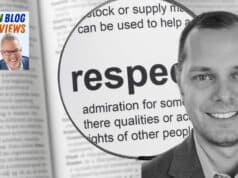Thanks, as always, to Ryan McCormack for this. He always shares so much good reading, listening, and viewing here! Subscribe to get these directly from Ryan via email.
News, articles, books, podcasts, and videos about how to make the workplace better.
Operational Excellence, Improvement, and Innovation
48 Years of Excellence in 48 Words – Tom Peters
Tom Peters, the legendary co-author of the business classic In Search of Excellence and exclamation point enthusiast, summarizes his insights in 48 words.

How Not to Organize In-house Experts
Get the right people in the right roles. It's common for organizations to hire management professionals and install them in leadership positions atop technical roles without regard for domain expertise or knowledge of the work. While there may be times where “a good manager” is all that's needed, technical expertise should still be prioritized to mitigate risk in environments of high-complexity. How Not to Organize In-House Experts: Lessons From Boeing.
Book Review: Productivity Reimagined by Jacob Stoller
Jacob Stoller's Productivity Reimagined: Shattering Performance Myths to Achieve Sustainable Growth challenges the conventional wisdom around productivity, reminding us that true success goes beyond simply maximizing output, driving shareholder value, and imposing command-and-control management systems.
Over 24 years ago, I became interested in how productivity and work design could improve lives and strengthen communities. Since then, I've dedicated my career to understanding how to achieve excellent results without treating people as mere cogs in a machine. This book has reignited my commitment to a core set of enduring principles that transcend both time and industry.
Stoller debunks several widely accepted myths about productivity. These include ideas like siloed sub-optimization (“The Myth of Segmented Success”), the belief that cutting costs leads to excellence (“The Myth of the Bottom Line”), the top-down reliance on expert knowledge (“The Top-Down Knowledge Myth”), the over-reliance on extrinsic motivation and fear (“The Myth of Sticks and Carrots”), and the belief in technological solutions as panaceas (“The Myth of Tech Omnipotence”). Instead, he advocates for approaches rooted in systems thinking, employee empowerment, and the principles of jidoka–all of which foster sustainable, humane productivity gains.
The book will particularly resonate with fans of W. Edwards Deming and the Shingo Prize, and it highlights organizations like Barry-Wehmiller, Menlo Innovations, and OC Tanner–companies that have thrived by empowering employees and embracing systems thinking. These examples are compelling (and I've had the privilege of visiting some of them myself), but they remain exceptions rather than the rule. It can feel like the same thought leaders are endlessly awaiting a breakthrough or revolution that never quite arrives, while most organizations continue to prioritize short-term profits.
Am I becoming cynical? Not at all. If anything, the promise of these principles strengthens my resolve to apply them wherever possible. Because sometimes, they do take hold.
Creating a Culture of Improvement
Act Small, Think Big at GFL
A great piece of how Patrick Dovigi, CEO of GFL Environment, drives operational excellence through principles of empowerment, collaboration, innovation, and community giving.
Doctors want work-life balance – to the chagrin of older doctors
“Healthcare is a calling.” I used to hear this a lot when I worked at the hospital. Sometimes this was said as a point of pride, sometimes to create a sense of community (an exclusionary one), and at other times, to appeal to a sense of mission to rationalize long hours and calls of duty. It's true that many of the best doctors I worked put their craft above all else, often sacrificing their personal lives and health to put caring for others first. But times are changing. Many of those entering medicine view it as any other corporate vocation, and are prioritizing work-life balance, but the old guard are reminding them that “that's not the job”. Given the shortage of healthcare professionals, something's going to have to give, and characterizing healthcare as a “calling” rather than a “job” may be a domino that falls.
Managers Don't Feel Connected to the Company Culture.
Most of us realize that our immediate leader has an outsized impact on our employee experience, and that culture can have an impact on results, especially over the long-term. Gallup reports that only 23% of managers feel connected to their company's culture. If we want better connection to purpose for our employees, we'd better start with their leaders.
Coaching – Developing Self & Others
Compassion and Competition
I recall being shocked by the comment. “You're too competitive,” the consultant shared with me during the results of a 360 review about 20 years ago. I always felt my competitiveness was my edge that helped me to continue to perform well.
“You have a blind spot in that you're willing to step over others to win.”
Again, I wasn't seeing a problem with that.
“There's no need to compete against your peers when there's nothing at stake. Show more compassion for your peers and you will go further.”
And that's when it hit me. Winning for its own sake was driving me to stop caring about others, and I began to work diligently to stop competing for no reason.
The fear that being compassionate means being complacent is fairly common, yet there has been an increasing shift in sports and business to become more compassionate. Does compassion have a place in elite sports where the stakes are so high? Sort of. A recent study of 12 high-performance elite sports coaches shows that compassion matters but the fear that caring about people too much means losing remains. Like most things, it's not an “either/or” situation. There can be compassion and competitiveness.
How to Stop Being a People Pleaser
With the increasing pace of change, saying “no” or “not now” is more important than ever to maintain focus and execution. But what if you struggle to say “no” because you're afraid to let others down? Here are some expert tips on how to stop being a people pleaser.
Follow Ryan & Subscribe:
LinkedIn: https://www.linkedin.com/in/rjmccormack/
Subscribe to receive these via email
Please scroll down (or click) to post a comment. Connect with me on LinkedIn.
Let’s work together to build a culture of continuous improvement and psychological safety. If you're a leader looking to create lasting change—not just projects—I help organizations:
- Engage people at all levels in sustainable improvement
- Shift from fear of mistakes to learning from them
- Apply Lean thinking in practical, people-centered ways
Interested in coaching or a keynote talk? Let’s start a conversation.









